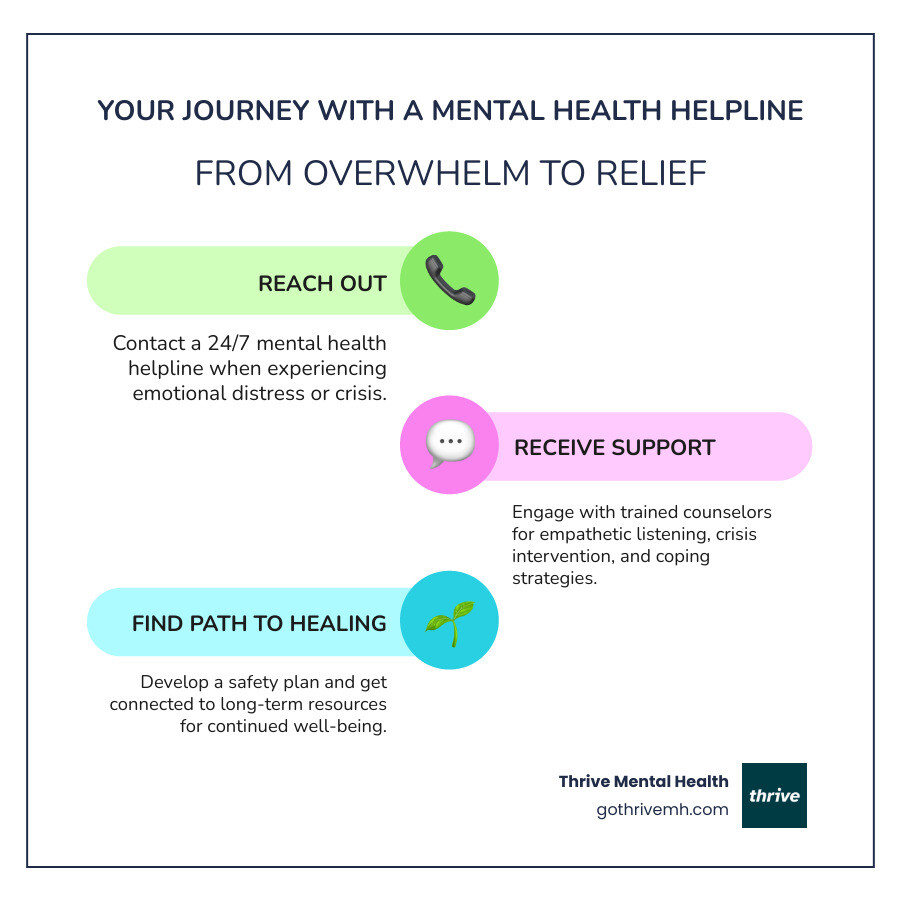Round-the-Clock Relief: How a 24 Hour Mental Health Helpline Can Help

Why a 24 Hour Mental Health Helpline Can Be Your Lifeline
A 24 hour mental health helpline provides immediate, free, and confidential support for anyone experiencing emotional distress or a mental health crisis. They are available 24/7 via phone, text, or online chat.
Key 24-Hour Mental Health Helplines:
- 988 Suicide & Crisis Lifeline – Call or text 988 for immediate crisis support
- Crisis Text Line – Text HOME to 741741 for text-based counseling
- Veterans Crisis Line – Call 988 and press 1, or text 838255
- The Trevor Project – Call 866-488-7386 for LGBTQ+ youth support
Mental health crises don’t follow a 9-to-5 schedule. When overwhelming anxiety strikes at 2 AM or depression feels unbearable on a weekend, professional help needs to be just a call away.
The reality is stark: suicide was among the top 5 leading causes of death for people ages 10-64 in the United States in 2021. Research shows that follow-up support from crisis lines prevented 79.6% of callers from taking their own lives, underscoring why immediate access to support can save lives.
Whether you’re struggling with anxiety, depression, suicidal thoughts, or just need to talk, these helplines connect you with trained counselors who can help you steer your darkest hours.
I’m Nate Raine, CEO of Thrive Mental Health. With over a decade in behavioral health and crisis intervention, I’ve seen how these immediate support systems serve as critical bridges between crisis and long-term healing.

Understanding 24-Hour Mental Health Helplines and Who They Help
When you’re feeling overwhelmed, a 24 hour mental health helpline is a lifeline to immediate support. These services provide crisis intervention and emotional support to anyone experiencing mental or emotional distress, regardless of who you are or what you’re going through.

These helplines are for everyone. You don’t need a formal diagnosis or a doctor’s referral. If you’re in distress and need someone to listen, that’s enough. Trained counselors are ready to help with suicidal thoughts, anxiety, depression, substance use, or overwhelming stress. They understand that crises don’t follow business hours, which is why support is always available.
At Thrive Mental Health, we know that reaching out is a brave first step toward healing. Helplines often connect people to longer-term resources like our Emotional Support Online services.
What specific concerns can a helpline address?
A 24 hour mental health helpline can help with a wide range of challenges. Trained counselors are equipped to handle immediate crises and overwhelming daily struggles.
- Suicidal ideation and self-harm: Counselors can help you work through these feelings and create a safety plan. This includes passive suicidal ideation, which involves thoughts of not wanting to be alive without active plans.
- Panic attacks and anxiety: Counselors can guide you through grounding exercises and breathing techniques to help you regain control.
- Severe depression, grief, and trauma: Helplines provide a compassionate ear and immediate emotional relief, helping you process difficult emotions.
- Other issues: Relationship problems, substance abuse concerns, or experiences like hearing voices can all be discussed. If it’s causing you distress, it’s worth calling about.
Are helplines free and confidential?
Yes. 24 hour mental health helplines are completely free and confidential, removing two major barriers to seeking help.
Free service means no charges for calling, texting, or chatting. Major helplines like the 988 Suicide & Crisis Lifeline are public services, ensuring cost is never an issue.
Confidential conversations create a safe, judgment-free space to speak openly. Counselors follow strict privacy policies to keep your information secure. The only exception is if you’re in immediate danger of harming yourself or others, or if there’s evidence of child abuse. In these cases, counselors may involve emergency services as a last resort to keep you safe.
How a 24 hour mental health helpline Operates

A 24 hour mental health helpline is a system designed for accessible, compassionate support. Understanding that crises don’t wait, they offer multiple ways to connect whenever you need it.
You can call to hear a human voice, text for a quieter, less intimidating option, or use online chat for real-time written conversation on secure platforms.
Behind each method are trained counselors and volunteers skilled in active listening, de-escalation, and crisis intervention. Their goal is not long-term therapy but to provide empathy and practical support in your moment of crisis. This often involves collaborative problem-solving, creating a safety plan, and connecting you with ongoing resources. To learn more about the process, see What to Expect When You Call.
What to expect from a 24 hour mental health helpline
Knowing what to expect can ease the anxiety of reaching out. The experience is designed to be as supportive as possible.
Most helplines offer a no-wait connection to an empathetic, non-judgmental listener. The counselor will gently assess your safety to understand how to best help. They may offer immediate coping strategies, like breathing exercises, and work with you to create a safety plan. You control the conversation and can share as much or as little as you’re comfortable with. There is no pressure, and you can always call back.
Do helplines offer follow-up services?
Yes, many helplines now offer follow-up services, a crucial evolution in crisis support. The 988 Suicide & Crisis Lifeline, for example, has made follow-up a required best practice.
If you’ve discussed thoughts of harm, a counselor may ask for your permission to follow up. This is not a check-up but a form of continued support to ensure you’re still safe. These calls or texts usually occur within 24-72 hours to review your safety plan and help connect you with long-term resources, such as local therapists or programs at Thrive Mental Health.
The impact is significant. According to the 988 Lifeline Follow-up Guidance, 79.6% of people who received follow-up reported it stopped them from killing themselves. This simple act of caring saves lives and bridges the gap between crisis and recovery.
Key 24-Hour Mental Health Helplines in the United States
Knowing who to call in a crisis can make all the difference. The U.S. has a network of 24 hour mental health helpline services, including broad national resources and specialized support lines for specific communities.
988 Suicide & Crisis Lifeline
The 988 Suicide & Crisis Lifeline is a primary resource for mental health emergencies. This easy-to-remember number connects you to a national network of over 200 local crisis centers.
Call or text 9-8-8, or use their online chat for support with suicidal thoughts, substance use, or any emotional distress. The service is for anyone, anytime. Learn more at the 988 Suicide and Crisis Lifeline website.
Crisis Text Line
When talking isn’t possible or comfortable, Crisis Text Line offers a valuable alternative. It’s especially popular with younger people but is designed for anyone who prefers text-based support.
Text HOME to 741741 to connect with a trained volunteer crisis counselor. They are skilled in text-based intervention and can help you move “from a hot moment to a cool calm.” The conversations are confidential and support a range of issues, from anxiety to suicidal thoughts. Visit Crisis Text Line to learn more.
The Veterans Crisis Line
Military service brings unique challenges, and The Veterans Crisis Line provides specialized support from responders who understand military culture, many with military experience themselves.
Call 988 and press 1, text 838255, or chat online to connect. This resource is for veterans, active service members, National Guard and Reserve members, and their families. Counselors understand issues like PTSD, deployment challenges, and service-connected disabilities. Learn more at the Veterans Crisis Line website.
The Trevor Project
The Trevor Project is dedicated to crisis intervention and suicide prevention for LGBTQ+ youth and young adults, who may face additional challenges like family rejection or bullying.
Call 866-488-7386, text START to 678678, or chat online to connect with counselors trained in the specific issues faced by the LGBTQ+ community. Serving ages 13-25, they provide a safe, affirming space to talk openly without judgment. Find more information at The Trevor Project website.
Helpline vs. 911: Knowing Who to Call in a Crisis
In a mental health emergency, choosing between a 24 hour mental health helpline and 911 is crucial for getting the right response. The simple rule is: call a helpline for emotional distress when there is no immediate physical danger, and call 911 when a life is at immediate risk.
Call a 24 hour mental health helpline for:
- Suicidal thoughts without an immediate plan to act
- Overwhelming anxiety or panic attacks
- Severe depression, loneliness, or emotional distress
- Substance use concerns
- The need for a trained, compassionate person to talk to
The response from a helpline involves trained crisis counselors who use active listening and de-escalation. The goal is to talk through the crisis, create a safety plan, and maintain confidentiality.
Call 911 for:
- An active suicide attempt or imminent threat of violence
- A medical emergency, such as an overdose
- A person who is unresponsive or unconscious
- Physical assault or domestic violence in progress
The response from 911 involves police, paramedics, or firefighters dispatched to the location. Their focus is on securing the scene and handling immediate physical threats. While necessary in a true emergency, this can sometimes escalate a mental health crisis. According to some data, about 1 in 5 people killed by police since 2015 were experiencing a mental health crisis, highlighting why specialized mental health services are often a better first call when possible.
Helplines prioritize confidentiality, while a 911 call may become part of public records. Law enforcement involvement is rare with helplines, whereas it is standard with 911. If you are ever unsure and believe there is physical danger, call 911. For more guidance, see NAMI’s advice on calling 911 and talking with police.
How to Support a Loved One Using a Helpline

Watching a loved one struggle is difficult. You want to help but may not know how. A 24 hour mental health helpline is a resource for you, too. You can call for guidance on how to support someone else. You don’t have to carry this burden alone; your role is to be a supportive presence who helps them connect with professional help.
If you notice signs like withdrawal, hopelessness, or feeling overwhelmed, they may be open to support. Your goal isn’t to be their therapist, but to help them find the right resources, like our information on Mental Health Care Online.
Steps for helping someone else
If you’re worried about a loved one, here are steps to help them connect with a 24 hour mental health helpline:
- Assess for immediate danger. If they are an immediate threat to themselves or others, call 911.
- Listen without judgment. Create a safe space for them to share. You can start with, “I’ve noticed you seem down lately, and I’m worried. Do you want to talk?”
- Express your concern. Use “I” statements, like “I care about you and see you’re going through a tough time,” which feels more supportive than “You need help.”
- Gently suggest a helpline. Frame it as an option. Say, “There are trained people who can help with these feelings 24/7. Would you be open to calling? I can stay with you.”
- Have the number ready. Find the right helpline (e.g., 988, Crisis Text Line) to remove a barrier.
- Provide privacy. If they agree to call, give them space but stay nearby for support.
- Follow up with care. A simple, “I’m thinking of you,” can mean a lot, but respect their boundaries.
Your support, combined with professional help, creates a powerful safety net.
Frequently Asked Questions about 24-Hour Helplines
It’s natural to have questions before calling a 24 hour mental health helpline. Here are answers to some common concerns to help you feel more confident about reaching out.
What kind of training do helpline counselors receive?
Counselors receive comprehensive training to handle crisis situations. This includes:
- Crisis intervention and de-escalation techniques to respond effectively to acute emotional distress.
- Suicide risk assessment to evaluate safety with care and precision.
- Active listening and empathy skills to build rapport and hear you without judgment.
- Collaborative safety planning to help you create a personalized plan to stay safe.
Most counselors also receive ongoing supervision and education to ensure they are providing the best possible support.
Can a helpline trace my call or send someone to my house?
Confidentiality is the cornerstone of any 24 hour mental health helpline. Tracing calls or involving emergency services is extremely rare and a last resort. It only happens if you disclose an immediate, specific plan to harm yourself or others, and the counselor cannot de-escalate the situation through conversation. Their primary goal is always to work with you to create a safety plan. Helplines do not track your location or share your information without your consent, which is also required for any follow-up services.
How can I find the right 24 hour mental health helpline for a specific issue?
Finding the right helpline is straightforward, and there’s no wrong door for seeking help.
- Start with 988 if you’re unsure. The 988 Suicide & Crisis Lifeline is equipped to handle any mental health crisis and can refer you to specialized services if needed.
- Look for specialized helplines for specific challenges. The Veterans Crisis Line supports military members and their families, while The Trevor Project offers affirming support for LGBTQ+ youth.
- Use resource directories from organizations like NAMI and SAMHSA, or check your local mental health authority’s website for regional crisis lines.
Even if you don’t call the “perfect” line, any helpline will work to connect you with the right support. The most important step is to reach out.
From Immediate Relief to Long-Term Healing
A 24 hour mental health helpline is like an emergency room for your emotional well-being. It provides the crucial first step of stabilization during a crisis by de-escalating distress and ensuring you are safe.
However, like an ER, helplines are for immediate stabilization, not long-term treatment. They are the critical bridge from crisis to ongoing care, where you can build lasting change. Building long-term resilience requires professional therapy to understand deeper patterns and develop stronger coping skills. This is the path from surviving to thriving.
Many find that Virtual Therapy: A Convenient and Effective Approach to Counseling removes barriers to getting this ongoing support.
At Thrive Mental Health, our programs are designed for this next step. Our virtual and in-person intensive outpatient (IOP) and partial hospitalization (PHP) programs are for adults and young professionals who need more than crisis intervention. We offer flexible, expert-led, evidence-based care custom to your needs, accessible throughout Florida.
Helplines save lives with immediate relief. We build on that foundation by offering a pathway to comprehensive recovery. If you’re ready to move from crisis management to genuine healing, we invite you to Explore Vital Mental Health Services that can help you not just survive, but truly thrive.